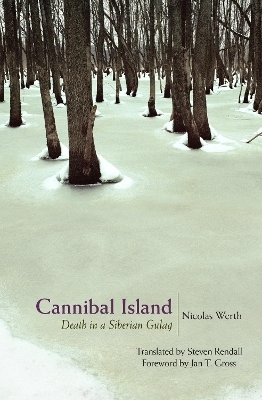
Cannibal Island
Death in a Siberian Gulag
Seiten
2024
Princeton University Press (Verlag)
978-0-691-25879-9 (ISBN)
Princeton University Press (Verlag)
978-0-691-25879-9 (ISBN)
During the spring of 1933, Stalin's police rounded up nearly one hundred thousand people as part of the Soviet regime's "cleansing" of Moscow and Leningrad and deported them to Siberia. This work weaves this episode into a broader story about the Soviet frenzy in the 1930s to purge society of all those deemed to be unfit.
A searing historical account of a tragic episode of the Stalinist terror
During the spring of 1933, Stalin’s police rounded up nearly one hundred thousand people as part of the Soviet regime’s “cleansing” of Moscow and Leningrad and deported them to Siberia. Many of the victims were sent to labor camps, but ten thousand of them were dumped in a remote wasteland and left to fend for themselves. Cannibal Island reveals the shocking, grisly truth about their fate.
These people were abandoned on the island of Nazino without food or shelter. Left there to starve and to die, they eventually began to eat each other. Nicolas Werth, a French historian of the Soviet era, reconstructs their gruesome final days using rare archival material from deep inside the Stalinist vaults. Werth skillfully weaves this episode into a broader story about the Soviet frenzy in the 1930s to purge society of all those deemed to be unfit. For Stalin, these undesirables included criminals, opponents of forced collectivization, vagabonds, gypsies, even entire groups in Soviet society such as the “kulaks” and their families. Werth sets his story within the broader social and political context of the period, giving us for the first time a full picture of how Stalin’s system of “special villages” worked, how hundreds of thousands of Soviet citizens were moved about the country in wholesale mass transportations, and how this savage bureaucratic machinery functioned on the local, regional, and state levels.
Cannibal Island challenges us to confront unpleasant facts not only about Stalin’s punitive social controls and his failed Soviet utopia but about every generation’s capacity for brutality—including our own.
A searing historical account of a tragic episode of the Stalinist terror
During the spring of 1933, Stalin’s police rounded up nearly one hundred thousand people as part of the Soviet regime’s “cleansing” of Moscow and Leningrad and deported them to Siberia. Many of the victims were sent to labor camps, but ten thousand of them were dumped in a remote wasteland and left to fend for themselves. Cannibal Island reveals the shocking, grisly truth about their fate.
These people were abandoned on the island of Nazino without food or shelter. Left there to starve and to die, they eventually began to eat each other. Nicolas Werth, a French historian of the Soviet era, reconstructs their gruesome final days using rare archival material from deep inside the Stalinist vaults. Werth skillfully weaves this episode into a broader story about the Soviet frenzy in the 1930s to purge society of all those deemed to be unfit. For Stalin, these undesirables included criminals, opponents of forced collectivization, vagabonds, gypsies, even entire groups in Soviet society such as the “kulaks” and their families. Werth sets his story within the broader social and political context of the period, giving us for the first time a full picture of how Stalin’s system of “special villages” worked, how hundreds of thousands of Soviet citizens were moved about the country in wholesale mass transportations, and how this savage bureaucratic machinery functioned on the local, regional, and state levels.
Cannibal Island challenges us to confront unpleasant facts not only about Stalin’s punitive social controls and his failed Soviet utopia but about every generation’s capacity for brutality—including our own.
Nicolas Werth is a research director at the Centre National de la Recherche Scientifique in France. He is the coauthor of The Black Book of Communism.
| Erscheinungsdatum | 19.03.2024 |
|---|---|
| Übersetzer | Steven Rendall |
| Vorwort | Jan T. Gross |
| Verlagsort | New Jersey |
| Sprache | englisch |
| Maße | 133 x 203 mm |
| Themenwelt | Geschichte ► Allgemeine Geschichte ► Neuzeit (bis 1918) |
| Geisteswissenschaften ► Geschichte ► Regional- / Ländergeschichte | |
| Sozialwissenschaften ► Politik / Verwaltung | |
| ISBN-10 | 0-691-25879-1 / 0691258791 |
| ISBN-13 | 978-0-691-25879-9 / 9780691258799 |
| Zustand | Neuware |
| Informationen gemäß Produktsicherheitsverordnung (GPSR) | |
| Haben Sie eine Frage zum Produkt? |
Mehr entdecken
aus dem Bereich
aus dem Bereich
Giordano Bruno - ein ketzerisches Leben
Buch | Hardcover (2024)
C.H.Beck (Verlag)
CHF 41,85
das dramatische 16. Jahrhundert
Buch | Hardcover (2024)
Rowohlt Berlin (Verlag)
CHF 47,60
Kunst und Gesellschaft an der Schwelle zur globalen Welt
Buch | Hardcover (2024)
Klett-Cotta (Verlag)
CHF 56,90


